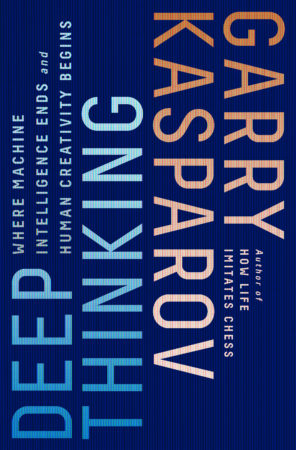

A new book offers the chess master’s account of his famous match against Deep Blue—and some thoughts on the future of AI.
Former world chess champion Garry Kasparov is long overdue for telling his side of the story regarding his famous match with the IBM computer Deep Blue in May 1997. The six-game exhibition has been described as a milestone in artificial intelligence, but also as a sad day for the (human) world of chess.
But then, important matters are seldom black and white. In the new book Deep Thinking, Kasparov and longtime writing partner Mig Greengard intertwine his experiences—before, during, and after the match—with a historical overview of chess-playing AI to produce a well-written, accessible book that provides food for thought about our future alongside increasingly intelligent machines.
Many in the chess community, who may buy the book for insight into the match’s outcome, will be surprised to see a side of Kasparov that the general public has not seen before—a man who has mellowed over time. When at the top of his game, he oozed confidence and was often viewed as arrogant. He was relentless in his drive for perfection and unapologetic about his actions and public statements. But in Deep Thinking it is obvious that Kasparov has done a lot of reflection about the match. Accusations have been replaced by admissions. The big surprise is that in several places he apologizes for his actions. The following text undoes many of the claims he made in the heat of the battle:
I have been asked, “Did Deep Blue cheat?” more times than I could possibly count, and my honest answer has always been “I don’t know.” After twenty years of soul-searching, revelations, and analysis, my answer is now “no.”
He still has the competitive fire in his belly, as evidenced by his anger with the aftermath of the match. He did not get the rematch that he expected and that the public wanted. Instead of belaboring this point, however, he laments that “the real victim of this betrayal was science.”
Those in the artificial-intelligence and technology communities may buy this book because of the intriguing tag line “Where machine intelligence ends and human creativity begins.” The book gives a good but brief discussion of the potential for symbiosis between human and artificial intelligence, whether that means “outsourcing” simple cognitive tasks like memorizing phone numbers to a faithful computer servant or achieving a partnership of equals where both sides contribute to decision-making, as seen in man-plus-machine versus man-plus-machine chess.
Throughout, Kasparov is optimistic about AI technology and its potential to enhance human lives. This is refreshing to read, given the recent spate of negative publicity. The following quote nicely sums up his attitude:
If we feel like we are being surpassed by our own technology it’s because we aren’t pushing ourselves hard enough, aren’t being ambitious enough in our goals and dreams. Instead of worrying about what machines can do, we should worry more about what they still cannot do.
It is nice to finally have Kasparov’s story on the record, albeit possibly clouded by the passage of time. However, it does not really change the way history will judge this event. To date, building programs that beat humans at checkers and chess have meant creating a series of idiots savants. Each feat has been a massive software and/or hardware project, requiring many person-years of effort. Clearly, this type of progress is not scalable. What’s more, games like chess represent a tiny subset of the problems that humans tackle. The rules are set and do not change. The board is small. There is no chance or hidden information. The game result is a zero sum. In the real world, none of that applies. While the technology deployed in Google DeepMind’s Go-playing program AlphaGo may have the potential for wider applicability, Deep Blue lacks any general-purpose problem-solving abilities. Thus, it remains an interesting historical data point with little long-term impact on the field of AI.
Garry Kasparov reached supremacy at chess, but with his retirement in 2005, he tried to move on to a much harder game: politics. In his career, he checkmated many kings and supposed kings. Now he pours his heart and soul into toppling Vladimir Putin. That he can decide to dramatically switch careers, train himself for his new challenge, plan a course of action, and execute such a plan in an ever-changing, high-stakes environment fraught with personal risk speaks volumes about the differences that remain between man and machine. So does the writing of this book itself. Though both Deep Blue and AlphaGo are impressive accomplishments, they still fall far short of what Kasparov is capable of as a human being.


